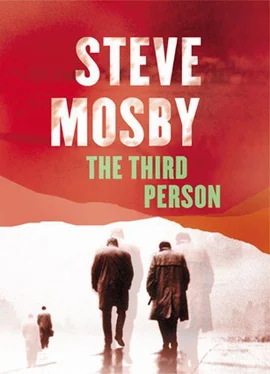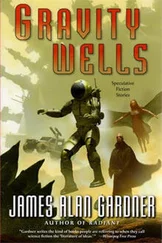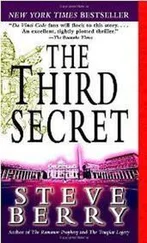Steve Mosby - The Third Person
Здесь есть возможность читать онлайн «Steve Mosby - The Third Person» весь текст электронной книги совершенно бесплатно (целиком полную версию без сокращений). В некоторых случаях можно слушать аудио, скачать через торрент в формате fb2 и присутствует краткое содержание. Жанр: Триллер, на английском языке. Описание произведения, (предисловие) а так же отзывы посетителей доступны на портале библиотеки ЛибКат.
- Название:The Third Person
- Автор:
- Жанр:
- Год:неизвестен
- ISBN:нет данных
- Рейтинг книги:3 / 5. Голосов: 1
-
Избранное:Добавить в избранное
- Отзывы:
-
Ваша оценка:
- 60
- 1
- 2
- 3
- 4
- 5
The Third Person: краткое содержание, описание и аннотация
Предлагаем к чтению аннотацию, описание, краткое содержание или предисловие (зависит от того, что написал сам автор книги «The Third Person»). Если вы не нашли необходимую информацию о книге — напишите в комментариях, мы постараемся отыскать её.
The Third Person — читать онлайн бесплатно полную книгу (весь текст) целиком
Ниже представлен текст книги, разбитый по страницам. Система сохранения места последней прочитанной страницы, позволяет с удобством читать онлайн бесплатно книгу «The Third Person», без необходимости каждый раз заново искать на чём Вы остановились. Поставьте закладку, и сможете в любой момент перейти на страницу, на которой закончили чтение.
Интервал:
Закладка:
If I had Amy back, we’d argue again. We’d fight. I’d lose my patience with her. We’d sleep back to back. I’d flirt with strangers and then feel guilty, and then do it all over again. You don’t know what you’ve got until it’s gone – yes: that’s well known. But they never add that, if you actually got it back, all you’d do is forget the value again. Over and over.
And that was pretty much all that the crumbling façade of this little seaside town had to say to me. The truth of it was seeping in with the ozone, chattering in the fruit machines, hanging off the wall in jagged strips. It brought back Graham’s words to me at the coach station.
Maybe you should let it go .
Yeah, maybe.
But I kept walking, working my way slightly inland onto streets edged by pavements of shattered, sodden wood. There were gangs of cats living wild in the branching alleys. I found Dennison’s front door, and checked the number just to make sure: this was it, all right. It had a rusted brass knocker in the middle. I rapped three times, and then took a step back and waited for him to answer.
After a second or two, I heard movements inside, heading for the door.
A pause.
I watched the spy-glass, and could feel it watching me back.
Nothing. I got impatient.
‘Hello?’ I said, and rapped the door knocker aga-.
Natural selection favours the well-adapted: that’s why we’re here. That is why giraffes have long necks, tigers have sharp teeth and turtles have hard shells. These are features which have evolved and become refined because they give those animals a better chance of survival than the animals without them. What this means, in reality, is that many millions of once-living creatures were killed or died because they weren’t as well adapted. To have an advantage, there has to be something for you to have an advantage over.
Animals starve because they are less well-suited to finding food than other animals. They are killed because they are less able to defend themselves, or because they can’t outrun a predator.
In literature, texts die because they are less well-suited to the environment of our culture. They die out when they no longer appeal to us. We burn the books. We shred the paper, reconstituting it as a text we prefer. Once living ideas and themes are destroyed forever as whole paragraphs are excised from existing works. Every time we press delete, something dies.
Every time we reject a novel, we indulge in consumerist eugenics.
Now, at a genetic level, it doesn’t matter when an individual is killed. Matter , after all, is a human word. In nature, there is only well-adapted and less well-adapted : an entirely mechanical process. The individual is a vehicle for the propagation of the genes within, just as a book is a hard, physical machine for the transportation and reproduction of ideas. When a dog or a cat or a human baby dies, or when a text goes out of print, it’s ultimately nothing more than a machine stopping working. The genes within it were not successful in building a machine best-suited to surviving the environment. Some succeed. Most fail.
An important question, then.
Why do we cry ?
There’s an equally important answer.
Because it is no longer fashionable to think of natural selection as a positive progression. We don’t think it’s right that less well-suited animals must die. In the animal kingdom, nature is indeed still red in tooth and claw, but we human beings like to think we have stepped beyond that. We have words like matter, right and wrong .
These are nothing more than themes and ideas, and they have evolved within us because they are tremendously good at surviving in us. They are concepts with real appeal. Human beings do not have claws or razor-sharp teeth; we have society, and the themes of right and wrong are ones which promote kinship. They bind us together in our society, continually tightening it around us as we promote them and propagate them.
We don’t allow our handicapped to be ripped to shreds. We heal our sick, and look after our elderly. Those less well-suited to the environment are given benefits and helped to live and work by the state. Infants without parents are put up for adoption and brought up by genetic strangers who grow to love them regardless. We feel a strong sense of duty to help those less fortunate than ourselves, and when a weaker, less advantaged individual is hurt, or dies, we feel a sense of shame and regret that we didn’t do more to help.
Natural selection still occurs, but we have shifted it onto an entirely different plane – even with animals. If a man tortures or kills an animal – even something as insignificant as a rabbit or a mouse – we put him in jail. It is wrong to hurt and wound. It is even wrong to neglect. We set up shelters for homeless animals, to stop them shivering and starving on the streets, and people spend years training in medicine solely so they can treat injured animals, often returning them to the wild afterwards. We employ our value system liberally and indiscriminately. The human instinct is becoming universal: when something is weak, exposed and vulnerable, we try to help it. And more than that, we think it would be wrong not to.
Our Society has two main aims.
The first is to campaign against practices which inflict unnecessary death, torture and cruelty on unwanted texts.
Our main target in this area is censorship. When a tiger is loose amongst the general population, we make an attempt to recapture it because it is dangerous. We house it in a zoo or return it to the wild. But when a dangerous idea is manifested in a dangerous text, that text is simply eradicated or not allowed. This is a heinous double-standard. There is no difference between burning a book and burning an animal, and when you slice out a paragraph, you gouge out an eye or hack off a leg. We propose safe, managed environments, where supposedly dangerous animals are allowed to exist in small numbers. In short: we support a rating system (but oppose any racial value judgements based thereon).
Our second aim is the rescue and rehoming of unwanted texts. Every scrap of used language is alive. We are aware that it is impossible to save them all. Even the most committed animal rights activist tramples down blades of grass and kills bacteria by treating disease or wiping down a surface with a sterilised dish-cloth. We can only do what we can. Not every bus ticket can be saved; not every discarded shopping list, scrunched into a ball. But here at the Society’s centre, our motto is this: we turn away nothing. We run a collection service in several major cities, ready to pick up used and unwanted texts. These units of volunteers will then pass the texts to a compilation team, who will enter their genetic code into the Society’s databanks, where it will be allowed to exist alongside other texts for as long as the Society continues. That way, the genes – at least – of these creatures will be preserved.
Please do not throw away your used texts.
We are only a telephone call away.
CHAPTER TWELVE
A surreal truth: as my consciousness was gradually solidifying, the fractured image inside – hanging in my head like a blurred poster – was the passport photograph of John James Dennison.
He just didn’t look like that anymore.
His hair had been cut – short and neat – and he looked tanned and fit. Maybe seaside living had worked a wonder on him. I recognised him from the eyes, which still seemed to protrude a little, but they were about all that remained of the sallow, ugly, long-haired individual that had posed for that passport photo. He also looked considerably older, and slightly more calm.
I blinked, and it hurt.
Читать дальшеИнтервал:
Закладка:
Похожие книги на «The Third Person»
Представляем Вашему вниманию похожие книги на «The Third Person» списком для выбора. Мы отобрали схожую по названию и смыслу литературу в надежде предоставить читателям больше вариантов отыскать новые, интересные, ещё непрочитанные произведения.
Обсуждение, отзывы о книге «The Third Person» и просто собственные мнения читателей. Оставьте ваши комментарии, напишите, что Вы думаете о произведении, его смысле или главных героях. Укажите что конкретно понравилось, а что нет, и почему Вы так считаете.












